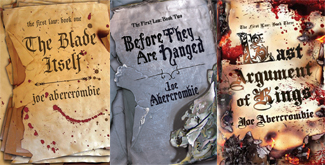Going Berserk

I dig these covers.
“For when the War God fills this flesh I wear
I am no more your friend I am the spirit of the bear”
— “Don’t Call My Name in Battle,” from Songsmith by Alexander James Adams (as Heather Alexander)
I recently read the First Law Trilogy by Joe Abercrombie and I was struck by the character Logen Ninefingers, called “The Bloody Nine.” When I started the first book, I suspected that the character was something of an homage to Robert E. Howard’s Conan and others of the great sword and sorcery heroes of yore.
But I was wrong.
Logen’s roots go much further back, to the like of Beowulf and Cú Chulainn. Both of those mythic heroes were known for the power of their battle rages. Among the Celts, this was known as the ríastrad (sometimes translated as warp spasm).
But the character of Logen Ninefingers does not come from an analog of Ireland. Instead he comes from an analog of the old Germanic tribes, which makes him a berserker.
Berserk — derived from the term bear shirt (also bare-shirted, though this translation is less accepted now) which is supposed to refer to how they went into battle — is the word associated with the frenzied battle trances of certain types of warriors, in which fire and edged weapons seemed unable to harm them. The berserkers were almost unstoppable when their fits were upon them.
Logen Ninefingers is a fearsome warrior, even when he is fully in control of his faculties. But sometimes, just sometimes, a wave of cold overwhelms him, and the side of him that he refers to as “the Bloody Nine” takes over. The Bloody Nine fights on through wounds that would cripple or kill another man. The Bloody Nine kills wantonly, not caring for friend or foe, nor warrior or innocent.
It’s the best portrayal of the berserker I’ve seen in modern fiction.
Logen hates the Bloody Nine. Every sane person fear it. But worst of all for Logen, no one but him distinguishes between the two.
In mythic or epic fantasy, Logen might have become a hero. But Abercrombie’s part of the new school of fantasy that many have taken to calling grimdark. So as far as the people of his world are concerned, Logen is a villain. The reader may understand him and care for him, but this grants him no immunity from the ways of plot.
I’m tempted to say more, but I don’t want to delve into spoilers. The trilogy is quite good, but be warned: it’s also dark and depressing.

